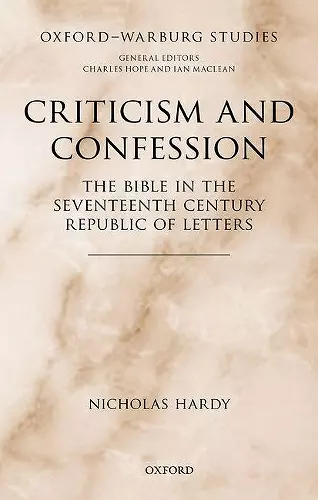Criticism and Confession
The Bible in the Seventeenth Century Republic of Letters
Format:Hardback
Publisher:Oxford University Press
Published:6th Jul '17
Currently unavailable, and unfortunately no date known when it will be back

This book explores the interplay of biblical scholarship and theological debates in seventeenth-century Europe, offering a fresh perspective on the era's intellectual dynamics.
In Criticism and Confession, the author delves into the intricate debates surrounding the text and meaning of the Bible during the seventeenth century in Europe. This period, marked by both the late Renaissance and the early Enlightenment, is often seen as a high point for a community of scholars who sought to approach biblical studies critically. However, the book challenges the notion that these scholars were able to rise above the intense religio-political conflicts of their time. Instead, it argues that all forms of biblical scholarship were deeply intertwined with theological disputes, and that collaboration among scholars of differing confessions was the exception rather than the rule.
The study highlights the technical challenges faced by scholars as they worked with original biblical texts, while also addressing the religious and political pressures that influenced their methods. Through a comparative analysis of various confessional and national contexts, Criticism and Confession sheds light on how scholarly practices diverged based on ecclesiastical affiliations. It reexamines the contributions of pivotal figures such as Joseph Scaliger and Isaac Casaubon, alongside lesser-known scholars, revealing a more nuanced picture of the intellectual landscape.
By integrating methodologies from literary, political, and religious history, this book offers a fresh perspective on the evolution of biblical criticism in the seventeenth century. It not only provides a new historical narrative but also critiques contemporary scholarly assumptions regarding the interplay of erudition, humanistic culture, and religious identity, ultimately enriching our understanding of this complex era.
Criticism and Confession exemplifies the very best kind of scholarly book: one that challenges a long-standing narrative and, by interweaving penetrating insight with multivectored erudition, manages to make an important field exciting again. * Debora Shuger, University of California, Los Angeles, Renaissance Quarterly *
Criticism and Confession ranges widely and provides a densely referenced treatment of its subjects * Lisa Al-Faradzh, The Seventeenth Century *
A great strength of the book is Hardy's detailed knowledge of the networks of the scholars he covers, which enables him to relate their letters and manuscripts to their interventions in the printed debate. As befits an Oxford- Warburg study, the book delves deeply into the scholarly controversies of the period and explains clearly but precisely how academics went about resolving those controversies - as least in so far as this could be done through erudition, discovery and the operation of patronage. It is a richly textured (and impressively footnoted) account of a complex, intricate and often rather tense world. * Grotiana 39 *
guides the reader through a series of fascinating debates... Hardy's achievement is not only to draw our attention to the confessional biases in early modern biblical criticism, but to tease out how those biases operated. * Grotiana *
Nicholas Hardy's brilliant book is destined for a long life thanks to its intensive research and bold revisionist argument . . . Hardy's uncompromising and rigorous account will come as a salutary challenge to anyone who wants to discuss these subjects and as an enormous illumination to those who have not studied the primary material ( . . . ) this book is the most forceful achievement so far of the new movement toward early modern scholarship and religion. * Kristine Haugen, History of Humanities *
[T]his is an ambitious work that helps us to better understand the 17th-century Republic of Letters and especially those figures whom historians have previously been eager to place in a heterodox camp and interpret as part of the gradual secularization of modern scholarship. Hardy's work directs us to the importance of contextualizing early modern scholars with an eye toward their social circles, lines of patronage, and intended audiences. He broadens the scope of evidence by analyzing published works alongside incomplete drafts, suppressed manuscripts, and correspondence, and engages in close readings that show a sensitivity to the theological dimensions of these scholarly works of criticism. * Katrina Jennie-Lou Wheeler, Reading Religion *
Criticism and Confession is a learned, stimulating and original study in which Nicholas Hardy prompts a profound reconsideration of traditional views. * Alastair Hamilton, Times Literary Supplement *
powerful and controversial ... an ambitious work that covers an entire century. It has no rival. * Scott Mandelbrote, Peterhouse, University of Cambridge *
resurrects the unity of a whole intellectual culture, which was characterized by a dynamic engagement with ancient texts ... very well-researched ... excellent command of sources in Latin and Greek * Jean-Louis Quantin, École Pratique des Hautes Études *
- Winner of Received an Honorable Mention for the 2019 Phyllis Goodhart Gordan Book Prize, awarded by The Renaissance Society of America.
ISBN: 9780198716099
Dimensions: 222mm x 152mm x 33mm
Weight: 700g
478 pages